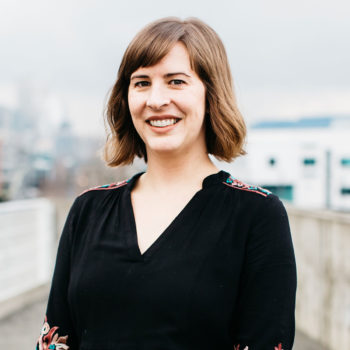Our service in the world is informed by our unique identity and calling, meaning it will look different for each of us. So we decided to talk with Rachael Clinton (Master of Divinity, ‘10), Director of Care and Teaching for The Allender Center. Rachael is known as something of a pastor here at The Seattle School, even though it doesn’t look like the more traditional role of pastoring a local church. We asked her about her journey of living into her calling, even when it looks different than what others might expect.
Find out more about our Master of Divinity program.
Could you give us an overview of what you do?
My title is Director of Organizational Development for The Allender Center at The Seattle School—which, honestly, is really functioning like an Executive Pastor. I get to do leadership development for our staff at The Allender Center, creating consistent structures of communication, professional development, care, support. I’m also on faculty with The Allender Center, so I teach and work on the blog and podcast, as well as facilitating groups.
It’s interesting that all of those things—from the relational to the technical to the administrative—often fall under the role of pastor, too. Which raises another question: What does it mean to be a pastor?
I often joke that being a good pastor is just like being a good parent, but specifically in the realms of spiritual formation and identity development. When I think about a pastor, I think about someone who tells stories that help people locate themselves in a larger story. Both individually—“Who is God, and who are you?” and collectively—“Where have we come from, where are we now, where are we going?” I think it’s about providing good care.
I often say that, vocationally and in my calling, I’m a pastor by orientation. I find that whether I’m working in a tea shop and serving people crepes and loose leaf tea, or working on an admissions team recruiting students to a graduate program.
I’m guessing the tea shop’s not hypothetical.
No, I worked at a loose leaf tea shop the year after I graduated from The Seattle School.
Was there a period of finding it hard to identify as a pastor, since you weren’t in the traditional paid staff position at a church?
Two moments come to mind. First, I did not come to graduate school to become a pastor, even though I came to pursue an MDiv. I came from a tradition where women couldn’t be pastors, so I didn’t have much imagination for myself as a pastor. I came to The Seattle School because I thought I would be a professor. I knew I would do ministry, but I would maybe just do ministry through the academy. Then during my third year, Paul Steinke named me as a pastor. There was something about someone actually naming me pastor, inviting me to see that as part of my identity, that was really powerful.
And then, during our formational years at The Allender Center, there were some moments where we were in the midst of a lot of spiritual warfare and a lot of despair. I remember Dan was introducing me before the large group to teach, and he said, “Rachael really is the pastor of The Allender Center.” And as he said that, there was something that felt really true to me about that. It’s not a way I would necessarily have seen myself, but it was a way I was bringing myself in the midst of our team, calling us to remember who we are and who we’re called to be. So I felt like the unofficial pastor of The Allender Center, and then there’s the question of, what does it mean to be the pastor of a nonprofit? Is that sacrilegious?
It seems like there are layers: Something was going on inside you regarding your own identity and calling, but something else happens when others see that and name it. Why do you think that outward affirmation is so meaningful?
I think there’s something about anointing that is really important. We see that throughout the text, right? It’s something we’re meant for and made for: to have others bless aspects of our calling and identity and vocation. I think it’s why something like an ordination process holds so much meaning in the Church. There’s a way of anointing, honoring, and consecrating—setting apart a role. Though I think, at times in our culture, that setting apart means the role is elevated in a way that some people who have the esteem of pastor really abuse that power, and it creates this false dichotomy that people who are pastors or leaders in a ministry are actually doing ministry, not everyone else. That’s a really weak, thin theology, a really weak, thin missiology, a really weak, thin sense of what the Church actually is and how it functions.
This process of recognizing your pastoral gifting and embracing that and naming it true—how has that journey clarified or refined how you understand calling?
I don’t see calling as being just connected to vocation. It’s far more expansive than that. It’s that sense of knowing that, no matter what I’m doing, it’s okay to bring these parts of myself.
And there is some mythology that calling is static, when I actually think it’s something that develops and grows and shifts. I think it does stay pretty consistent in its rootedness, but the fruit it bears can change in different seasons. So we always need to be growing and learning and have a posture of curiosity and a willingness to surrender to formational processes.
“I don’t see calling as being just connected to vocation. It’s far more expansive than that.”
What would you say to somebody else who is recognizing aspects of their calling as a pastor, but also recognizing that it might come out in an unconventional context?
The more we know who we are, then we can make better decisions about where we want to give those parts of ourselves. Calling, again, is about more than vocation. Calling is about union, calling is about love—it’s always about love. So what are the really unique ways that you are equipped and gifted to love people and communities well? For some people, that will look like very traditional roles that have really clear boundaries, really clear definitions, and there’s nothing wrong with that. For others, it might mean you meander a bit, because there are certain skills you need to develop that go along with that calling. Some people might look at it and go, “Oh, this is a real deviation from your calling,” and I would say, “No, I actually think it was preparing me to be more fully equipped for my calling.”
So I would tell people, especially those who will find themselves in more unconventional spaces, we need healers and pastors and artists and therapists working in lots of different contexts. And it may not always look like the textbook. That doesn’t mean you’re not being faithful to live out your calling well.
Part of what we’re exploring is inspired by Barbara Brown Taylor’s language of your “altar in the world,” and the idea that our work in the world is a form of worship. Do you want to say anything about that?
Oh, I really like that. I was just reading Romans 12, and I love Paul’s language of living faithfully to what you’ve been gifted—and that’s going to look different for each person in different seasons, based on different giftings—just be faithful to bring those gifts to the world in such a way that it is like a living sacrifice. I think we’re really scared of that word, sacrifice. And rightfully so—there’s been some theological and spiritual abuse that has used a word like sacrifice to maintain oppressive structures of power that are actually anti-Gospel. However, when we give of ourselves in a way that actually leads unto life, I think that’s that living sacrifice that Paul calls us to.
Learn more about our Master of Divinity program and how you can pursue your unique calling.


